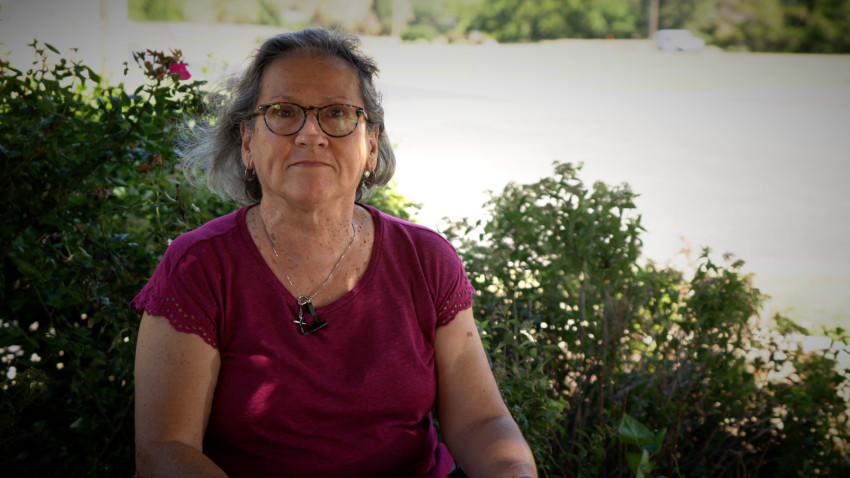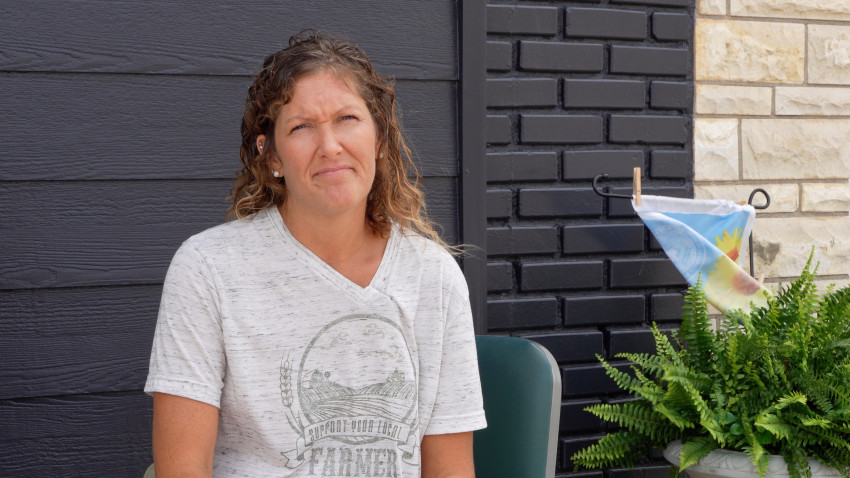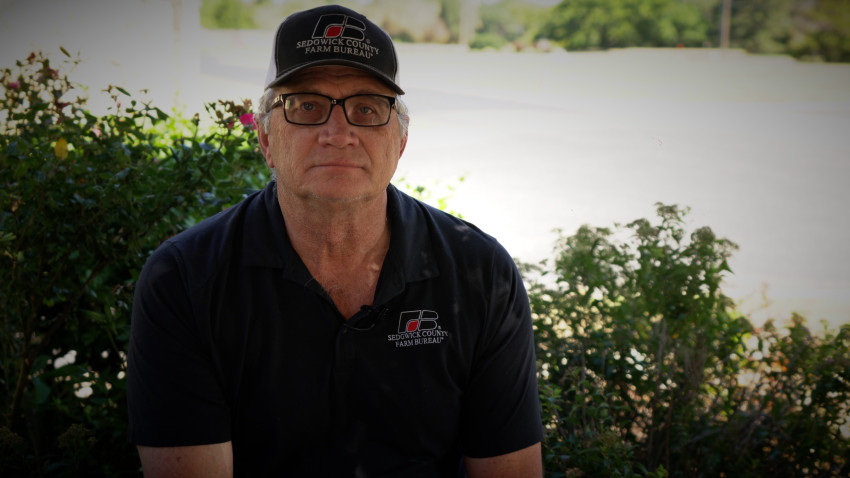By Sheridan Wimmer on November 9, 2022
Mental Health Matters in Rural Kansas Communities

Donna Wise was 18 years old when her dad died by suicide. We often associate this age with fresh high school graduates, heading to their first year of college if they so choose, but for Wise, she dealt with loss.
“I recognize how much I lost, and of course how much he lost,” says Wise, a Sedgwick County Farm Bureau member who raises corn, wheat, sorghum and soybeans in Clearwater. “Had he been able to find another way to deal with the pain he was feeling, there could have been an entirely different outcome. My life would have been different.”
Stresses of farming and ranching
Taking care of ourselves means a lot of different things. Exercising, eating healthful foods and trying to stay away from bad habits come to mind. Just like our physical health, caring for our mental health requires us to look inward, recognize where we’re lacking and put effort into creating positive changes. For farmers and ranchers, the additional stressors and stigma around mental health and the difficulty of finding resources that fit their needs has led to more conversations about helping this important sector of our society.
Ashley Beying, a nurse practitioner, farmer, rancher and mom in Osage County, helps her community live healthier lives, whether it’s by treating high blood pressure or diabetes, or by encouraging her patients to recognize the signs and seek the resources related to improved mental health. And since she’s in a rural area, she often treats patients who are involved in farming and ranching.
“I have a unique opportunity to not only be engaged in production agriculture, but I also get the chance to get to know our farmers and ranchers in the clinic setting and help take care of them,” Beying says. “Mental health is such a huge issue, and it’s something that a lot of people have had a lot of concern about over the past couple of years. I’ve been able to talk to farmers and ranchers about the struggles they’ve had.”
As we’ve all struggled through a global pandemic, farmers and ranchers have had additional stressors affecting their mental well-being.
“When you look at the changing prices of grains and commodities, your input costs going up, the weather being very volatile, and of course time, there’s a lot of things on farmers’ and ranchers’ plates,” Beying says. “When patients visit my clinic, I can gauge if they’re at risk or struggling with their mental health and guide them to the services they need or provide the care they need.”
When wildfires break out in Kansas, farmers and ranchers are often impacted in unbelievable ways. They lose cattle, homes and in some cases, everything. Finding ways to pick up the pieces is difficult for a group of people stereotypically known for keeping their hats down low, pulling themselves up by the bootstraps and getting back to work. Jewell County resident Christina Jeffery experienced a wildfire close to home in March 2022 when one came dangerously close to her in-laws’ home, and much like any other wildfire in Kansas, Jeffery knew other farmers and ranchers in her area needed support.
“There’s so much going on with our farmers and ranchers and the stress they deal with, then you add a fire, and it was hard,” Jeffery says.
“They put so much time and effort into farming and then they see their equipment on fire, and everything’s gone. I had to get people to have conversations about their mental health. Everyone struggles. We just have to start the conversation.”
Suppressing stigma
Starting the conversation may be difficult for some. A recent poll by American Farm Bureau Federation has shown the stigma around seeking help or treatment for mental health has decreased but is still a factor in agriculture. While rural adults indicate a 9 percent decrease in stigma attached to those who seek help for mental health, 59 percent say there is still at least some stigma around stress and mental health in the agriculture community — and 63 percent of farmers and farm workers agree.
Mick Rausch, a farmer in Sedgwick County, is a proponent of seeking help for mental health. He is passionate about telling his story so other farmers and ranchers feel safe talking to someone.
“I’m recovering from mental health issues myself,” Rausch says. “I’m on medication. I think it’s important to share your story to get other people to open up about how they’re going through their difficulties.”
Rausch was experiencing hardships in his life: His brother was diagnosed with stage 4 cancer and there was a late frost on his wheat that prevented him from having a wheat crop at all, impacting his livelihood as a farmer.
“I’m a typical farmer. We’re all so independent. If we can’t get it done, we just work harder. That’s what our sense is,” Rausch says. “I was spending more hours out in the field trying to work harder to make up for the things I was doing wrong and it’s hard for a selfsufficient male to reach out and ask for help. For me, though, there is no shame in asking for help.”
Farmers typically consider themselves introspective, private people. Some are more apt to keep their feelings and emotions inside, and they like their fences because they make good neighbors. However, farmers like Wise know there’s at least one person she feels comfortable talking with about her mental health.
“I am an introvert myself, so I don’t like to talk about personal things with just anybody, but I can talk to my doctor,” Wise says. “I can talk to the people who can make a difference, who can make it better.”
Nurse practitioners like Beying are also ready to talk.
“My hope is we can start to break down those barriers around the stigma associated with mental health,” she says. “We can start to educate people that it’s OK to not be OK 100 percent of the time. There are resources out there to improve your mental health.”
See the signs of those who struggle with mental health
Many times, we can identify changes in our loved ones who are struggling.
“If someone is struggling with mental health, there are some signs and symptoms you can watch for,” Beying says. “If their sleep pattern has started to change, if their appetite isn’t what it used to be, if their energy level has gone down or they’re just not motivated anymore. Sometimes they’re more irritable or agitated, or they start to seclude themselves from their relationships. If you notice your loved one is struggling with any of these signs or symptoms, it’s OK to have that conversation and ask them if they’re OK or guide them to get the support they need.”
For Wise, noticing signs within herself is just as important as keeping an eye on her friends and family.
“It’s important to pay attention, to recognize when I’m feeling bad and what can I do about it,” Wise says. “There are options, lots of options. I want people to recognize they can reach out and find those.”
When it comes to farmers and ranchers, their stress signals could look unique — like a decline in the care of their crops, animals and farm or an increase in farm accidents — but things we should look for in anyone, no matter their occupation, include:
Changes in behavior
- No longer participating or enjoying activities they usually do
- Isolating from friends and family
- Sleeping more or sleeping less
- Giving away prized possessions
- Increasing drug or alcohol use
Changes in appearance
- Neglecting basic hygiene care
- Looking tired or sad frequently
- Dramatically losing or gaining weight
Changes in mood
- Experiencing increased irritability
- Becoming agitated easily
- Failing to make commitments
- Feeling hopeless
Changes in things they say
- “I have nothing to live for.”
- “My family would be better off without me.”
- “I don’t want to be a burden.”
Seek help for your mental health
The issues in agriculture are unique, but we all share stressors in one way or another. Whether through medication, therapy, exercise, simply talking to a friend or family member or a combination of any of these things, there are resources available to help you find what works for you. If you notice someone struggling, reach out. If you’re struggling, seek help.
“My wife and I had several discussions, and we knew I needed help, so I scheduled an appointment with a doctor,” Rausch says. “I keep taking my medications and know tomorrow is a better day, and I just keep trying to move forward. I’ve got grandkids, and I’m looking forward to what life has to offer now.”
“In each region of Kansas, there are mental health centers serving communities,” Beying says. “This is a great resource for individuals to reach out to. Sometimes in your local communities, you’ll find groups that are supportive of mental health. In our local school, they have a yellow ribbon club where they provide awareness on mental health.
“Nationwide, they’ve implemented the 988 suicide hotline that’s readily available if someone is struggling or having thoughts of self-harm,” Beying says. “They have individuals who are ready to talk to them and get them the help they need.”
Whether you find support in your home, in your community or on a national level, there are options.
“It’s been 51 years since I lost my dad and I still weep when I think about all we missed,” Wise says. “My dad wasn’t here to meet my sons. It would have been so much different if he had found a different solution.”
Getting the help you need is not weakness — it’s wisdom.










